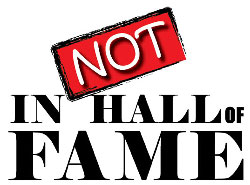
Committee Chairman
Kirk Buchner, "The Committee Chairman", is the owner and operator of the site. Kirk can be contacted at [email protected] .
The Brian Giles Debate: 2015
Dec 23, 2014
Published in
Hall of Fame Debates
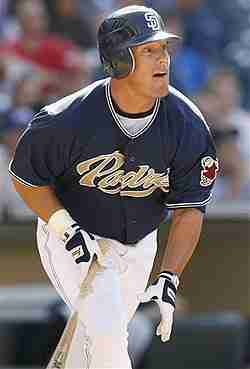
This is the seventh of our series where we here at Notinhalloffame.com, do what else? Debate the merit of twenty-four men on the most loaded Baseball Hall of Fame ballot in our lifetime.
Joining me, the site's Committee Chairman, in this debate are D.K. of the site's Phillies Archivist blog and Darryl Tahirali of the site's DDT's Pop Flies blog. This looks to be a very important part of our site, and we hope you will enjoy reading this as much as we enjoyed writing it.
Chairman: Brian Giles is another one of those guys that when I think of the Baseball Hall of Fame I would ever equate with. Hell, I almost didn’t even include him I the 24 we were going to discuss. The first thing I thought of was here is a guy who was only an All Star twice (and with bad Pittsburgh teams) yet a quick look at his career stats reminded me that he was a lot better than I remembered. Sure he was saddled with some pretty mediocre teams, but a .400 career OBP with some decent power numbers tells me that he wasn’t that far. Hell, if he was half decent defensively he could have been this generations Bobby Grich, who was also “one and done” like I expect Giles to be.
Darryl: "Half-decent defensively" underlines why the comparison between Brian Giles and Bobby Grich won't work: Grich was an excellent middle infielder defensively who was a potent offensive force at a time when middle infielders didn't hit. Giles was a corner outfielder who was expected to show good offense, and he did—surprisingly good, as that .291/.400/.502 slash line shows—but, yes, he was a defensive liability in right field. Giles joins a host of very good outfielders we've seen come onto the ballot in the last few years—Moises Alou, Steve Finley, Luis Gonzalez, Shawn Green—but in terms of career numbers or peak dominance, Brian Giles looks more like Garret Anderson than any of those four. I do like that Giles walked 348 more times than he struck out, unusual in this strikeout-happy era, but that's hardly a blue chip to take to the Hall.
D.K.: Giles had a four year peak between 1999 and 2002 where he averaged 37 home runs per year, but that will be viewed as too brief a period of excellence or dominance. His career totals of 287 HR and 1,897 hits are indicative of a player who was pretty good, but not great - and not a Hall Of Famer.
Chairman: Basically, are saying that we have a decent player who certainly had a good career but debating his merits seems a little pointless, especially on this ballot. Are we agreed on that assessment?
D.K.: Agreed, Chairman. Giles was a well-above average hitter, hitting a robust
.291 for his career, but not much a defender. I had hoped during his career hat he would at least distinguish himself by reaching the 300 home runs and 2,000 hits milestones, but from a combination of aging and injuries he failed to do even that. Giles was a pretty good ballplayer, especially at the plate, but not a Hall Of Famer.
Darryl: Agreed. Giles was an excellent player, not an elite one. And I don't think he would merit much attention on any ballot in previous years or decades.
Chairman: With all due respect to Brian Giles, who had a solid career, this is my easiest no. In retrospect I let decent numbers cloud me into thinking he may have worth discussing.
D.K.: I really liked Giles and he did have those four years of 35+ home runs, but I can’t vote for him. - NO
Darryl: No.
The Nomar Garciaparra Debate: 2015
Dec 23, 2014
Published in
Hall of Fame Debates
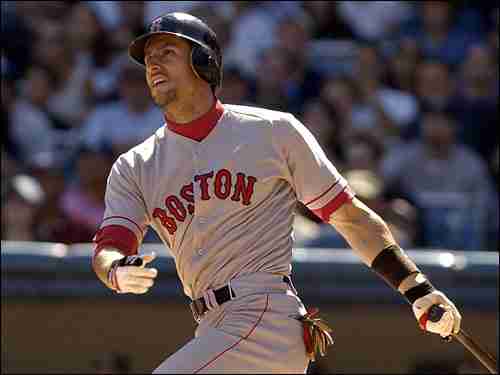
This is the sixth of our series where we here at Notinhalloffame.com, do what else? Debate the merit of twenty-four men on the most loaded Baseball Hall of Fame ballot in our lifetime.
Joining me, the site's Committee Chairman, in this debate are D.K. of the site's Phillies Archivist blog and Darryl Tahirali of the site's DDT's Pop Flies blog. This looks to be a very important part of our site, and we hope you will enjoy reading this as much as we enjoyed writing it.
Chairman: Ah…”Nomah”. I don’t know about the two of you but when I think of Garciaparra in relation to the Baseball Hall of Fame all I can think is that is this was 2003, the three of us would have said in unison (or so I think we would) that this guy was a future Baseball Hall of Famer, and probably on way to being a lock. It didn’t quite work out that way did it, and now when I think of Garciaparra, I think of Jimmy Fallon’s skit on Saturday Night Live, where he and Rachel Dratch played Boston fans. Not exactly the first thought you should come up when discussing a Hall of Famer is it?
Darryl: Nomar Garciaparra demonstrates just how amazingly difficult it is to become a Hall of Famer: A player must have both career longevity and an exceptional peak period—and not simply be a reliable compiler. Garciaparra roared out of the gate, and in 2003 we would have indeed declared him to be on the fast track for the Hall. His first half was Hall-worthy, but the drop-off from 2004 on killed his chances, and that is the sad fact about baseball immortality. A few players have made the Hall based on peak period alone, but those players—Sandy Koufax, Ralph Kiner—so dominated their periods that they overwhelmed the competition, and although Koufax was first-ballot, Kiner got in on the writers' vote by the skin of his teeth, literally—one vote over the minimum in his final year of eligibility. Garciaparra's early peak was not as dominant, although that may say more about the high talent compression in Garciaparra's time than his relative lack of absolute dominance—there are more good players now than in Koufax's or Kiner's time.
D.K.: Hit .313 lifetime, but he won’t get much support for the HOF. At one time he was considered on a par with Jeter and A-Rod among major league shortstops. Then a ton of injuries befell him and shortened his career. Unfortunately, the HOF doesn’t reward players on their potential or what they might have accomplished if they had stayed injury-free.
Chairman: So does this mean that mean that the three of us can agree that Nomar is one and done? Seriously, even with the most loaded ballot in recent memory would it matter? My question to the both of you is would Garciaparra make it to a second ballot if it were a less loaded list? Personally, I don’t think so, but I want to hear your thoughts on it.
Darryl: Yes, I do think Garciaparra would make it to subsequent ballots without so much competition, and he may in fact do just that this year anyway: Back-to-back batting titles and that .313 career batting average carry some weight. I'm reminded a little of Kirby Puckett here, who was voted into the Hall on his first ballot with only a 12-year career, although how much of that was sympathy for his glaucoma we may never know, and whether Puckett could have done that on this ballot is also uncertain, but I highly doubt it. So, although he won't get in, I'm not so sure that Nomar will be a one-and-done even on this ballot. On the other hand, I had Kenny Lofton pegged as a Hall of
Famer two years ago--and I still think he is--but he did not last past his first ballot.
D.K.: I think some writers will remember Nomar’s batting titles and his peak injury-free years and that will result in Nomar receiving 15 to 20 % of the vote. He’s not a “One and done”, but his position will be precarious and he may not make the full run of ten years on the ballot before dropping out with less than 5% some year.
Chairman: You are both more optimistic than I, as unless there are a lot more Boston sportswriters who have a say, I don’t think he gets off the maiden voyage. He wouldn’t on my ballot, as I vote no.
Darryl: No to No-mah.
D.K.: I vote No too, but I’m not crying for him. He married Mia Hamm. The same Mia Hamm. Nomar isn’t a HOFer but he does have Mia for consolation.
The Carlos Delgado Debate: 2015
Dec 21, 2014
Published in
Hall of Fame Debates
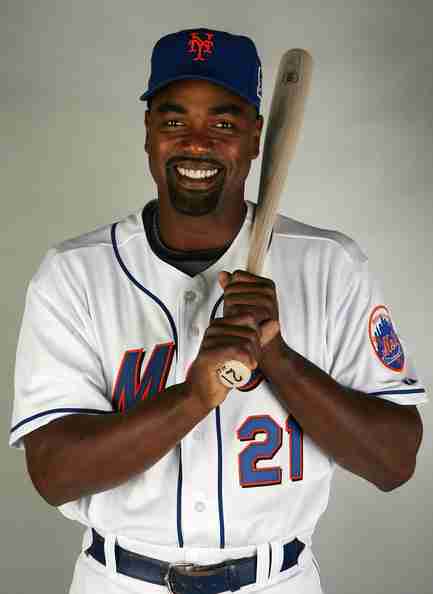
This is the fifth of our series where we here at Notinhalloffame.com, do what else? Debate the merit of twenty-four men on the most loaded Baseball Hall of Fame ballot in our lifetime.
Joining me, the site's Committee Chairman, in this debate are D.K. of the site's Phillies Archivist blog and Darryl Tahirali of the site's DDT's Pop Flies blog. This looks to be a very important part of our site, and we hope you will enjoy reading this as much as we enjoyed writing it.
Chairman: This should be interesting. Gentlemen, the first thing I think of with Carlos Delgado, is that this is a guy is a top contender for the – “The Baseball Hall of Very Good.” I don’t think that is such a bad thing, I mean as Baseball fans, if we had a team that we cheered for of six of these guys, we would have a World Series contender every year, but my first instinct with Delgado’s first ballot is that with some pretty good career numbers on this loaded ballot he could be one of the best “one and done” players of all time.
Oooh, there is an article! Building a “one and done” Hall of Fame ballot team. Now we could come up with a championship squad couldn’t we?
Darryl: You could build several "one and done" Hall of Fame ballot teams, which only goes to show how rarefied the air is in the Hall. So, alas, poor Carlos Delgado: He is the poor man's Fred McGriff, and even though I go back and forth on McGriff depending on the day of the week, his is truly a borderline case—and Delgado falls below that borderline. Let's face it: Power-hitting first basemen are hardly a rarity in the Hall, and you have to be exceptional to be included. Delgado had an excellent career, but it was not elite, and on this ballot he won't survive his first year.
Frankly, I admired Delgado's personal beliefs including his political stances regarding his native Puerto Rico, and he opposed American military intervention in Afghanistan and Iraq—he refused to stand for the singing of "God Bless America" in protest, which offended many fans, but it is rare to find a professional athlete these days who takes a public stand as they are largely businessmen reluctant to jeopardize their market value with unfavorable public relations (hello, Derek Jeter!). However, I don't think that will help or hinder his chances appreciably.
D.K.: Delgado only made two all-star teams so he’s probably not Hall Of Fame material. His career numbers of better than a hit per game and 473 home runs and 1,512 RBI on the surface are impressive enough so that maybe he might receive some consideration from a future panel of Veterans Committee voters, but he won’t receive much attention from the writers. This is his first year of eligibility with the writers.
Chairman: Darryl, I loved what you said about Delgado executing his personal beliefs with his stance against the United States against the Middle East. It did not receive a lot of press, nor did he do that with that in mind. Seriously, that elevates him in my eyes, but not to the point where I would say that it would push him to the Hall on my ticket.
He was one of many really good sluggers of the era, and while good, not at the level where I would say, “let’s induct him”. I honestly think that if he had these stats in another era, he would hang around the ballot. Frankly, I don’t think he will remain past this ballot, and going back to his stance, the fact that it went largely unnoticed kind of speaks to me as to just how famous he really was.
Darryl: If Delgado had these stats in another era, yes, he would look like a Hall of Famer. But would he in fact post numbers comparable to that era instead? By that I mean this: Delgado posted pretty good numbers during the Steroids Era--but so did many, many players. I'm not alleging that Delgado used PEDs. Rather, my contention is that it was a high-offense period and not merely because of PEDs.
In my 2013 ballot assessment, I noted the rise in the number of home runs across MLB during this period, and this included players regarded as clean, such as Shawn Green, who hit 49 homers in a season twice, once while playing in Toronto's SkyDome/Rogers Centre, which is a hitter's park, and once while playing in Los Angeles's Dodger Stadium, a pitcher's park. If Green is clean, and he's hitting that many homers, what other factors are responsible? Smaller ballparks? Weaker pitching? Maple bats? Getting back to Delgado: If his peak was not 1995 to 2005 but instead was 1985 to 1995, a lower-offense period, would he still hit 30-35 homers and drive in 90-100 runs, or would his output be scaled to the lower-offense era and be closer to 20-25 homers and 80-90 RBI? It may be impossible to know for sure, but I suspect that Delgado, or any player, would be scaled to the conditions of his era. If Delgado hit 40-45 HR and drove in 100-110 runs during his actual era, he would be a likely Hall of Famer, but he did not.
As for his political stance, yes, it is admirable but it is marginal to his case. I'm blabbing on as I usually do so I'll cut to the chase: This is the Hall of Great Baseball Players and not the Hall of Great Human Beings. Ty Cobb was a stone racist to his dying breath, and I cannot respect him for that, but he was one of the greatest baseball players ever and I would protest his ever being denied enshrinement for it. Conversely, I cannot support a ballplayer's off-field exploits being a deciding factor in his Hall case (and I generally agree with Delgado's positions, by the way). In fact, my only "role model" among baseball players in that respect is Bob Gibson, who once said, in essence, why should I be a role model for your kid? You be a role model for your kid.
D.K.: Long story short: Delgado was selected to only two all-star games and while he was a dangerous home run threat there had to be some holes in his game to get so little all-star support. Writers are just not going to give much support to someone who has taken so few trips to the ASG.
Not counting pitchers, who could miss the all-star game simply because they pitched for their team on the last day of regular season competition before the break, it seems to me that 5 all-star games is the minimum and even with five all-star appearances, there had better be a reason why they didn’t make more ASGs: The main reason being that they were overshadowed by great contemporaries who played the same position. Then these players might make The Hall via the Vets. Committee some day ie: Phil Rizzuto and Richie Ashburn (5 all-star games each) - were outstanding players but it took a historical oversight committee to recognize their greatness because there were so many good players playing their position during their careers. However, I can’t see a campaign starting for Delgado who reached the Mid-Summer Classic only twice.
Delgado did one thing really well - hit home runs, 473 of them to be exact, but the line must be drawn somewhere and so far players with higher home run totals than Delgado like McGriff, Sheffield and the Steroid boys are not in the Hall either.
Chairman: For me this is easy, though I am going to go a brief tangent first. I never put huge stock in All Star game appearances. I wish baseball would take up a similar model to the NBA and NHL and award First and Second Team All Stars at the end of the season, which would be a true measure of how someone was perceived at their position in a particular year. How many times have we seem people dominate in the second half of the season and receive MVP consideration yet not make the All Star Game? Same as players having great first halves and stinking up the rest. No matter, really but no matter how you slice it Delgado just wasn’t an elite player at his position and my vote is no.
Darryl: No.
D.K.: His impressive 473 home runs and the fact that had he not been injured late in his career he would have reached 500 HR earned him some consideration and he makes my top 15,but not my top 10 - So it’s a NO from me.
The Roger Clemens Debate: 2015
Dec 21, 2014
Published in
Hall of Fame Debates
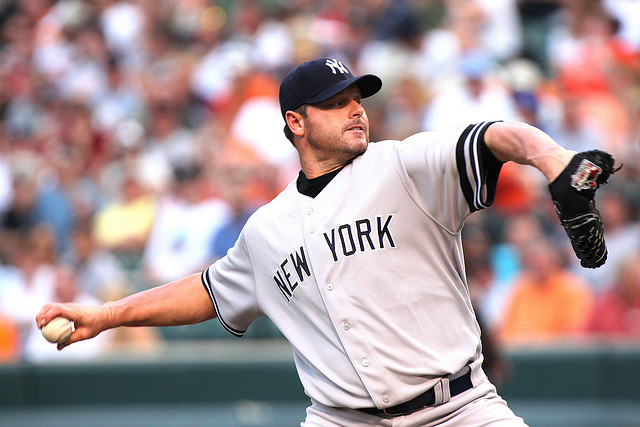
This is the fourth of our series where we here at Notinhalloffame.com, do what else? Debate the merit of twenty-four men on the most loaded Baseball Hall of Fame ballot in our lifetime.
Joining me, the site's Committee Chairman, in this debate are D.K. of the site's Phillies Archivist blog and Darryl Tahirali of the site's DDT's Pop Flies blog. This looks to be a very important part of our site, and we hope you will enjoy reading this as much as we enjoyed writing it.
Chairman: It seems so fitting that as we do this alphabetically by last name, we have Roger Clemens after Bonds, (#2 to #1 on the current rank) and almost everything you can say about Bonds in terms of the current vote, you just look at Clemens and say “Ditto”. Like Barry, The Rocket is on his third vote after seeing his support fall roughly two points (37.6 to 35.4) and while I think that someday these guys will get some kind of forgiveness, I just don’t see it this year; especially when Clemens’ likeability factor is a number similar to Minnesota winter…in Celsius. I will add this; I could see his vote percentage dip below 35.
Darryl: Two votes are not enough to venture a trend, and the same goes for the minor fluctuations both Barry Bonds and Roger Clemens have experienced in those two vote totals. However, I agree that the PEDs taint will most likely keep players with material evidence of it out of the Hall of Fame for some time. Look at Rafael Palmeiro—he's already off the ballot. How many hitters have ever combined 3000 or more hits with 500 or more home runs, as he did? Only three: Hank Aaron, Willie Mays, and Eddie Murray, and all three were first-ballot inductees. Palmeiro's dropping off the ballot was the line in the sand—no matter how good your record was, if the voters think it was ill-gotten, you are not getting in. Which brings up the whole question of whether we're looking at a Hall of Morality and not a Hall of Baseball Talent, but I'll save that bullet for another time.
As far as likeability goes, my flippant answer is, who cares? The Hall is full of unsavory and/or unlikable characters—Ty Cobb, Rogers Hornsby, and the great majority of any 19th-century player you can name—with the flip-side being that gee-whiz nice guys such as Gil Hodges and Dale Murphy have yet to see their likeability push their borderline cases across the threshold. That may change this year, though, as I strongly suspect that Hodges will be voted in by the Golden Era Committee.
D.K.: Barry Bonds, Roger Clemens, and Mark McGwire.
Bonds: all-time career homer mark with 763 plus season record holder with 73. Had over 2,900 hits. Clemens third most strikeouts all-time and third most Post world War Two wins being Spahn and Maddux. McGwire broke Roger Maris’ home run in a season record that stood for nearly a half-century.
Despite these noteworthy accomplishments - It doesn’t matter what I think - it’s what the writers think. With heavily suspected PED use, whether proven or unproven some writers are never going to give any of these candidates their vote - EVER!
Chairman: First off…Darryl, are you really mentioning Gil Hodges here? In the infancy of this site, I thought I had to ban someone over that entry (and no worries, it was never going to be you) over his defiant stance of the former Dodger. Incidentally, I am sure like me you were shocked by his (3 or under) on the Golden Era Vote just announced.
(Chairman’s Tangent) Seriously Hall of Fame, why can’t we get exact vote totals like we do in the writer’s ballot? Was it 3, was it 2, was it 1 or a goose egg? If you are going to be transparent about votes, do it across the board! (end tangent)
Let me throw this personal memory from the mid-80’s when my cousin and I went to Exhibition Stadium in Toronto shortly after Clemens struck out 20 batters for the BoSox and having a conversation with a vendor about the Rocket and how this was a must watch game. That for me means something about the Hall of Fame, in that was a player a must watch. Whatever era we are talking about with Roger, he was always “must watch”. That should mean something right? At every stage of his career, this guy was must watch T.V.
Darryl: Regarding Gil Hodges, well, I mentioned him only in passing. But as for the overzealous fan--hey, I like colorful street people who tell me that I'm going to hell if I don't accept Christ as my personal savior, or that NASA faked the moon landings, as long as they don't follow me home or ask me for too much money. Frankly, though, and even though I thought Hodges would get voted in this time, I'm more shocked that Maury Wills got nine votes. And it is curious that vote totals below three are never given. The only thing I can think of is that revealing the exact number could show that one or more voters did not use all four of his votes, although why that should matter I don't know.
Maybe if a candidate did not get any votes, it would be embarrassing for him, or it could prejudice future votes. Who knows?
As far as Clemens goes, yes, he was definitely must-watch, and that is one of the marks of Hall of Fame players, particularly when their numbers back them up. In my write-up on Clemens for 2013, I did crunch the numbers from before he was suspected of using PEDs, and he did have a Hall of Fame case, albeit a borderline one. He was a must-watch guy from the start.
D.K.: Clemens shot himself in the foot with his suspected PED use. He had great numbers: (#3 in strikeouts all-time), 3rd in Post-World War Two wins behind Warren Spahn and Greg Maddux, 2nd behind Maddux in Wins in the last 50 years, but they are all for naught. The writers that covered him, bestowing unending accolades on him during his career and singing his praises now feel betrayed and cheated that for a good part of his career Clemens may have had some “chemical help”.
We’re not going to see a relenting on the part of the writers who withhold their votes for Clemens and other suspected ‘chemical cheaters’ any time soon.
Chairman: I think we all agree the Rocket isn’t getting into Cooperstown anytime soon, but I am casting my fictional ballot to him, right behind my support of Barry.
Darryl: Yes.
D.K.: Call me a grudge holder, but when I think of the big deals his teams made out of the milestones he reached, particularly the Yankees in 2003 when
Clemens reached both the 300 Wins and 4,000 strikeouts marks, if he was secretly getting chemical help all that time, it makes me feel somewhat I’ve been led down the Yellow Brick Road by “The man behind the curtain”. - (That was a 1939 or 1940 reference, but I you want a more recent one, you only have to go back to 1977 or 1978 when Johnny Rotten of The Sex Pistols said to the concert audience after a particularly mediocre live rendition of one of their songs “Did you ever get the feeling that you were being cheated?” - I vote NO.
